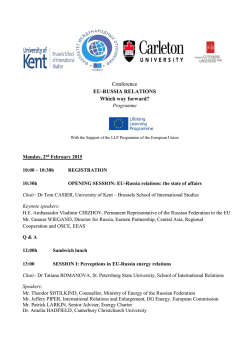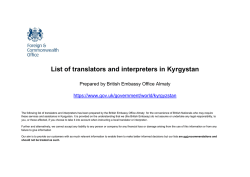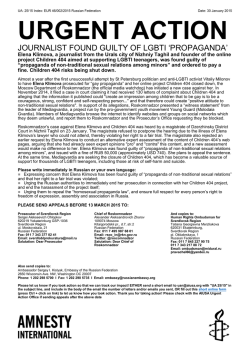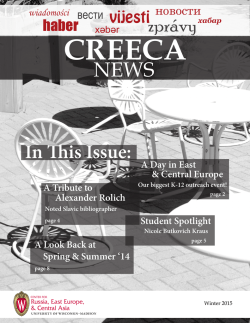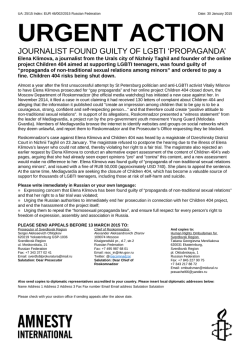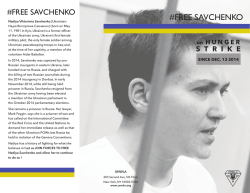
p8_Layout 1 - Kuwait Times
p8_Layout 1 2/1/15 8:06 PM Page 1 MONDAY, FEBRUARY 2, 2015 I N T E R N AT I O N A L Serbia grants citizenship to rival Palestine leader BELGRADE: Serbia has granted citizenship to a key political rival of Palestinian President Mahmoud Abbas after he pledged millions of dollars in investments from the Emirates, where he has lived in exile, Serbian officials said yesterday. Serbia’s Foreign Minister Ivica Dacic said that former Fatah party strongman Mohammed Dahlan, whom Abbas fired in a power struggle, was given the citizenship in 2013. His wife, four children, a relative and five Palestinian supporters were also given Serbian passports. The 53-year-old Dahlan, a former Abbas’ aide and Gaza security chief, was once seen as Yasser Arafat’s heir apparent. He was kicked out of Fatah in 2011 after Abbas accused him of corruption and hinted he may have been involved in Arafat’s death. Dahlan was sentenced in absentia by a West Bank court to two years jail in 2014 on defamation and slander charges because he alleged in an interview that Palestinian security forces help protect Israeli settlers in the occupied territories. Dahlan later said in a statement that the ruling was politically motivated and was meant to block him from competing in internal elections in Abbas’ Fatah movement and in future general elections. Dahlan, who turned into a businessman in exile, has promised millions of dollars of investments from the Emirates to Serbia. The Balkan country’s government can secretly grant citizenships to foreigners when it sees the individuals can serve special state interests. Dacic said that Dahlan was not given the citizenship on political grounds, but due to the economic relations with the Emirates. “When Dahlan was in Serbia, we spoke only about relations with the United Arab Emirates,” Dacic said. “Internal Palestinian issues were not on the agenda.” In December, thousands of Dahlan supporters protested against Abbas in the Gaza Strip amid reports that corruption charges involving millions of dollars will be filed against the former security chief.— AP Homeless capital LA counts its displaced LOS ANGELES: Notebook in hand, Ana Alvarez walked along the streets of Skid Row, the downtown Los Angeles district that’s sometimes called the homeless capital of America. Scores of tents and makeshift shelters had been erected for the night, all along the sidewalks. “We don’t get close to them. We try not to disturb them, because a lot of them are already asleep,” Alvarez said. She was helping with the homeless count that takes place every two years across the entire county. After dark, volunteers like her scour the vast region and tally up the number of people sleeping rough. “It’s important to know how many people live here, to assess the resources we need,” said Latoya Hawthorne, a census participant who works in a homeless women’s refuge. At the last count in 2013, Los Angeles had some 39,500 homeless people. If you include those camping or staying with someone, the figure jumps to 60,000. According to current estimates, some 3,000 people sleep on Skid Row’s urine- and garbage-strewn streets, their shelters made of cardboard, fabric or plastic and squeezed right next to each other. “We counted 24 homeless individuals; we luckily didn’t see any children or people under 18,” said Harry Batt, one of thousands of volunteers helping with the count. “It is very depressing,” he added, noting that a lot of the homeless are mentally ill. Veterans a priority A few blocks away, US Veterans Affairs Secretary Robert McDonald walked briskly, adding a mark on his notebook every time he sees a homeless person or a tent. His presence was a demonstration of the Obama administration’s desire to tackle the problem of military vets who have fallen into extreme poverty. Of some 630,000 homeless people in the United States, nearly 50,000 are former military personnel, according to official figures. Doran Mateik, a nurse who works regularly on Skid Row, led McDonald and his team, a map in hand. “I’ve been coming here for seven years, I try to get to know them, to see how I can help them. Some of them have become my friends,” she said. “I give them my address so they can receive some mail, or I try to assist them with the red tape.” At the end of road, McDonald stopped before a tall, thin black man with glasses who stood next to a shopping cart filled with possessions. “You’re a vet? So am I! how old are you? Sixty-three? I’m 61! Do you get the help you need?” the politician asked, as cameras rolled and journalists watched. The man refused to give his name, but said he was in good health. A woman from McDonald’s entourage handed him a business card detailing psychological services for former soldiers. “I’m not a suicide risk,” he said, politely. The woman invited him to see her at the Department of Veterans’ Affairs. “We want to help,” she said. The government says that since 2010 the number of homeless vets has fallen by 33 percent. Most are 50 years or older and served in Vietnam or the first Gulf War, but not in the post-September 11, 2001 campaigns. While McDonald finished up in the section they were allocated, a homeless man seated on the ground in front of his tent asked: “Why do they come at night? why don’t they come during the day? They scare me.” Alvarez explained that the census, the results of which will be published in April, takes place at night because during the day people move about a lot, partly because they are not allowed to linger in one place. “It’s a good thing they are counting them. The problem is that they get this info and do (nothing) about it,” said a former homeless man who goes by the name “General Dogon” and has become a campaigner. “I don’t see people getting off the street... all I see is more police.” — AFP KIEV: A woman places flowers on one of 30 crosses placed by activists bearing the names of people who died in shelling. — AP 13 killed in fight with Russia-backed rebels KIEV: Russian-backed separatists kept up their assault on railway hub in eastern Ukraine, fighting that authorities said has killed 13 government troops and wounded 20 others over the last day. The separatists were attacking several villages around the town of Debaltseve, a key rail link between the two rebel strongholds of Donetsk and Luhansk, Security Council spokesman Vladimir Polevoi said. Capturing the town would further consolidate the rebels’ control over eastern Ukraine. An Associated Press journalist saw more than a dozen Ukrainian tanks and other heavy military vehicles, including a rocket launcher, heading toward Debaltseve yesterday in an apparent effort to reinforce the government troops. There was no word on any rebel casualties. Seeking safety from the intense artillery duel, hundreds of Debaltseve residents have fled the besieged town, which has been without power, water and gas for more than 10 days. About 60 Debaltseve residents arrived yesterday in Kiev, the capital, where they took part in a protest outside the Russian Embassy. An adjacent garden was turned into a symbolic cemetery, with wooden crosses erected in memory of the 30 civilians killed by shelling in the southeastern city of Mariupol in late January. Plaques on the crosses said they were “killed by Russian occupiers.” ‘Undeclared war’ “Russia is conducting an undeclared war in Ukraine,” said Yevgeny Chebotarev, who met the people arriving by train from Debaltseve and was helping them find shelter. “Today it is obvious that behind the DNR and LNR (the Donetsk and Luhansk self-proclaimed republics) stand Russian troops and Russian weapons, whose victims are Ukrainian civilians.” Russia denies sending arms and troops to the rebels, who claim to rely solely on military equipment poached from the Ukrainian army. But the separatist forces have deployed vast quantities of powerful weapons, some of which military experts say are not in Ukraine’s arsenal. The conflict has claimed more than 5,100 lives and displaced more than 900,000 people since it began in April, according to UN estimates. A month of relative quiet in eastern Ukraine was shattered in early January by full-blown fighting as the separatists attempted to claw back additional territory from the government. Rebel leaders accused Ukraine of mobilizing forces in advance of an offensive. Representatives for the rebels, Russia, Ukraine and the Organization for Security and Cooperation in Europe met Saturday for four hours in Minsk, the capital of Belarus, but failed to make any progress toward a peaceful resolution.— AP CAIRO: Egyptian police try to clear the street where women rally at the spot where Shaimaa El-Sabbagh, a 32-year-old mother, was shot near Talaat Harb Square, during a protest. — AP Egypt covering up protester deaths Authorities whitewashing evidence of protests CAIRO: Rights group Amnesty International yesterday accused Egyptian authorities of intimidating witnesses and whitewashing evidence to cover up the role of security forces in the killing of more than two dozen people during protests last week. The London-based Amnesty said at least 27 people were killed over three days during protests commemorating the fourth anniversary of the uprising against longtime autocrat Hosni Mubarak. It said police used excessive force or failed to break up clashes between protesters and residents. Those killed included a female protester, Shaimaa El-Sabbagh, whose shooting as police dispersed a small, peaceful protest was captured in widely-shared footage. A 17-yearold female protester and 10-year-old were killed during clashes with police in Cairo and Alexandria. Two security men were also killed in the violence. Based on testimony from protesters, lawyers, witnesses and video footage, Amnesty said security forces used excessive force, repeatedly firing tear gas, birdshot and sometimes bullets “at random into crowds of protesters and bystanders who were posing no threat.” It also said some among the protesters were armed. “Harrowing scenes of protesters dying on the streets of Cairo are likely to be regularly repeated, given authorities’ total failure to hold security forces to account for human rights violations,” the group said. Amnesty said hundreds of protesters have been rounded up and placed in informal detention facilities. It said some had no access to their lawyers for more than 24 hours, a violation of Egyptian law. Amnesty said prosecutors have ordered witnesses to the killing of El-Sabbagh detained for taking part in unauthorized protests; a move it said was apparently aimed at intimidating them. A lawyer in El-Sabbagh’s case said a leading member in her political party was detained overnight and treated as a suspect even though he went in to testify. Amnesty said there are no independent investigations into the violence and that no officials have been questioned or held to account. Egyptian officials did not immediately comment on the report. Authorities say they are cracking down on violent protests aimed at destabilizing the country, as they fight a rising wave of militant attacks. — AP spy case shows Russia up to old tricks NEW YORK: Three men accused in the latest Russian spy case in the United States didn’t hide behind fake identities and weren’t stealing military secrets. They even appeared annoyed that their assignment wasn’t more like a James Bond film. Their alleged plot to dig up “economic intelligence” on possible banking penalties and alternative energy sources may not be the stuff of Hollywood movies, but US authorities insist the case is proof that Russian spying is thriving in America more than two decades after the end of the Cold War. It also shows the resources the US still throws at those suspected of being spies for Russian President Vladimir Putin’s government: listening bugs, hidden cameras and intercepted phone calls. “Russian spies continue to seek to operate in our midst,” US Attorney Preet Bharara warned after the arrests last week. Russian Foreign Ministry spokesman Alexander Luk-ashevich countered by accusing US authorities of manufacturing a spy scandal as part of its “anti-Russian campaign.” Economic warfare Annemarie McAvoy, a Fordham Law professor and former federal prosecutor, said the latest case shouldn’t be taken lightly. “We have to be concerned about the economic warfare end of this. That’s what worries me,” she said, noting the crippling cyber attack on Sony Pictures. She said the arrests might show that the spy game has changed as countries seek information to possibly attack businesses and the economy. The case against Evgeny Buryakov, Igor Sporyshev and Victor Podobnyy comes less than five years after the arrest of 10 covert agents - a sleeper cell referred to as “The Illegals” by the SVR, the foreign intelligence agency headquartered in Moscow - who led ordinary lives in the United States using aliases. All 10 pleaded guilty in federal court in Manhattan to conspiracy charges and were ordered out of the country as part of a spy swap for four people convicted of betraying Moscow to the West. Federal prosecutors in Brooklyn brought another spy case in 2013, accusing Alexander Fishenko, a naturalized US citizen from Kazakhstan who made millions off his Texas export firm, of being a secret agent for the Russian military. Fishenko, who pleaded not guilty, is scheduled to go to trial later this year. Not everyone views the latest case as a scary new wrinkle in spy tactics. “What is interesting about this case, just like the 2010 sleeper spy case, is how little these accused Russian spies are accomplishing. Either the FBI is just getting the low-hanging fruit, or the Russian foreign intelligence agency isn’t doing its job very well,” said Kimberly Marten, a political scientist at Barnard College, Columbia University. Prosecutors say the latest investigation exposed espionage by Sporyshev and Podobnyy, who held low-level diplomatic positions, and Buryakov, a Bronx resident with a visa and a position in the Manhattan branch of a Russian bank. Orders from Moscow US prosecutors say under orders from Moscow, Sporyshev’s main duty was to give Buryakov assignments to gather intelligence on potential US sanctions against Russian banks and efforts in the US to develop alternative energy resources. They say Sporyshev and Podobnyy would analyze the information and report back to the SVR at a Russian Federation office in New York they thought was secure but apparently was bugged. In one secretly recorded conversation, Podobnyy complained to Sporyshev that their work was nothing like “movies about James Bond,” according to the papers. “Of course, I wouldn’t fly helicopters, but pretend to be someone else at a minimum,” he said. Sporyshev griped that he too thought he “at least would go abroad with a different passport.” The court papers also detailed demands on Buryakov from SVR to come up with questions for a Russian news organization - believed to be Tass - to ask about the inner workings of the US stock market. Normally, prosecutors said, the two men would speak on the phone in code to set up meetings outdoors, with “Buryakov passing a bag, magazine or slip of paper to Sporyshev,” court papers said. Some meetings took place near Buryakov’s red-brick home on a quiet block in the Bronx. Neighbors said 39-year-old Buryakov, his wife and two children largely kept to themselves. They recalled a man sitting in a car on the block for hours at a time - in hindsight, they say, it was probably surveillance - but were surprised when the FBI raided the home last Monday. A judge ordered Buryakov held without bail. Podobnyy and Sporyshev, whose diplomatic status gave them immunity, have returned to Russia. A Russian spokesman told the Tass news agency that Buryakov “vehemently denies the alleged offenses.” — AP NEW YORK: Yevgeny Buryakov appears in federal court in Manhattan after his arrest earlier in the day in connection with a Cold War-style Russian spy ring that spoke in code, passed messages concealed in bags and magazines. — AP
© Copyright 2026


